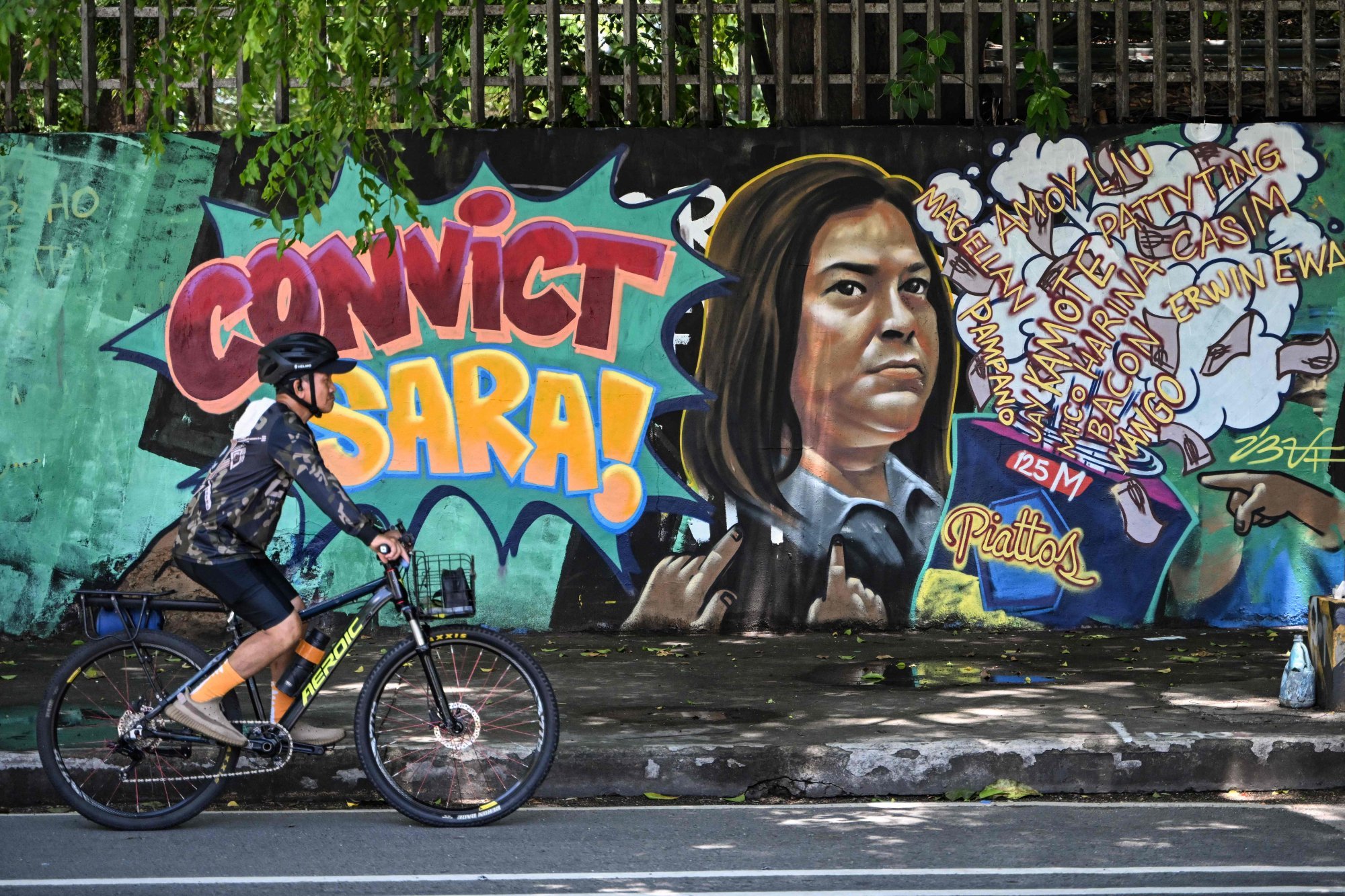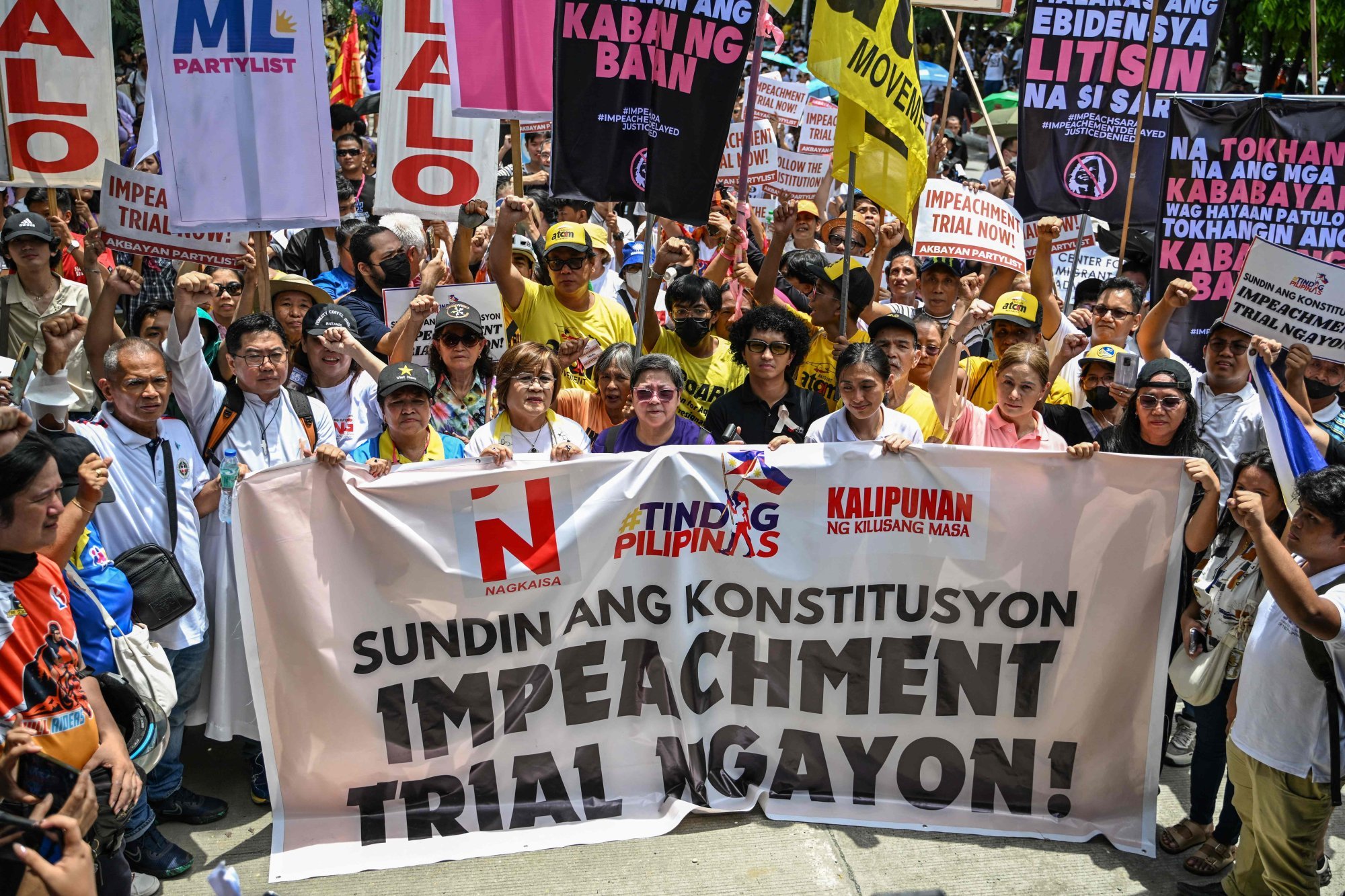Philippine senators split over legality of delaying Duterte’s impeachment trial
Protests grow as senators split on the trial’s timing, with Duterte allies pushing for the case’s dismissal

Mounting calls from legal scholars, civil society and protest groups are putting the Philippine Senate under pressure to launch an impeachment trial against Vice-President Sara Duterte-Carpio – even as her allies move to have the case dismissed.
Duterte-Carpio was impeached by the House of Representatives on February 5 on a wide range of serious charges that include large-scale corruption and plotting to assassinate President Ferdinand Marcos Jnr, his wife and the speaker of the house – allegations the daughter of former president Rodrigo Duterte has firmly denied.
The House of Representatives transmitted the Verified Complaint for Impeachment to the Senate on February 7 – just before the 19th Congress adjourned ahead of midterm election campaigning – triggering a constitutional requirement for the upper chamber to convene as an impeachment court “forthwith”.
However, Senate President Francis “Chiz” Escudero has repeatedly delayed proceedings, citing scheduling constraints and the need to tackle priority legislation first.
The Senate resumed session on June 2, but Escudero has said the impeachment trial will only begin on Wednesday, just days before Congress again goes into final recess on Friday. That would leave the trial to be resumed, if at all, by the incoming 20th Congress in late July.
A lawyer by training, Escudero has drawn scrutiny for his interpretation of the constitutional term “forthwith”. He told reporters it did not mean “immediately” but rather “within a reasonable period”, arguing that if the framers of the 1987 Constitution had meant instant action, “they should have used the word ‘immediately’”.
Speaking at a press conference on June 2, Escudero said the plan to convene the impeachment court on Wednesday would still be subject to plenary debate. He also cast doubt on whether the case could carry over to the next Congress, suggesting the 20th Congress might choose not to take it up. “The 20th Congress can say it doesn’t [cross over] and they can dismiss that,” he said.
“At the end of the day, you have to understand that in Congress, the plenary is supreme.”
But one of the Constitution’s original framers, retired Supreme Court Justice Adolfo Azcuna, has publicly rejected Escudero’s reasoning.
In a national TV interview, Azcuna said: “It was I who drafted Article XI of the Constitution … I also wrote the procedural section including the word ‘forthwith’ … and it is precisely meant to mean ‘immediately and without unreasonable delay’.”
Compounding concerns among watchdog groups, a draft Senate resolution calling for the “de facto dismissal” of the impeachment case has circulated among lawmakers.
It claims that Duterte-Carpio’s “constitutional right to a speedy disposition” of her case was violated due to “the lapse of more than 100 days since the transmittal of the Articles of Impeachment without any corresponding action on the part of the Senate”.
Senator Ronald “Bato” Dela Rosa, a close Duterte-Carpio ally, confirmed that the draft originated from his office. Escudero dismissed it as unofficial, and it remains unclear how many senators have signed on.

Protests mount
Petitions urging the Senate to proceed with a fair impeachment trial have been issued by top law schools, including the University of the Philippines College of Law – Escudero’s alma mater – as well as Ateneo de Manila University and San Beda College of Law, where Duterte-Carpio earned her law degree.
Public demonstrations are also gathering momentum. A week of protests organised by grass roots groups began on Monday outside the Senate building in Manila, featuring candlelight vigils and coordinated noisemaking efforts – known locally as ‘noise barrages’ – in which protesters bang pots, honk horns or use whistles to draw attention to political causes.
Sonny, a taxi driver who voted for Rodrigo Duterte in 2016, told This Week in Asia he had initially believed in the former president’s war on drugs – until photos surfaced showing Duterte with individuals later accused of drug trafficking. That, he said, made him question the sincerity of the campaign.
“If the [impeachment] trial does not push through, I will join the people power because no one – not even Sara – is above the law,” he said, referring to mass street protests reminiscent of the 1986 uprising that toppled dictator Ferdinand Marcos.
Divided Senate
The legal and political battle over the impeachment trial has deepened inside the Senate, with lawmakers split not only on constitutional interpretation but also on questions of leadership.
Senator Francis Tolentino, who recently lost his re-election bid while running under President Marcos’ slate, declared on June 2 that the trial “can no longer proceed due to constitutional and procedural limitations”.
He argued that under the 1987 Constitution, the Senate is “not a continuing body” – meaning that once its current term ends on June 30, all unfinished business, including the impeachment case, effectively expires and cannot be carried over to the next Congress.
But Armando Ligutan, a lawyer slated to join the prosecution team in the Senate impeachment trial, disagreed. He said Philippine legislative practice mirrors that of the US Congress, where impeachments have historically crossed from one Congress to the next.

“During the last impeachment trial, the 105th US Congress impeached then President Bill Clinton but his actual trial ‘crossed over’ to the 106th Senate,” he noted.
Speculation continues over Escudero’s motivations, including whether he feels indebted to Duterte-Carpio for her public endorsement of his 2022 Senate bid despite not being on her party’s official slate.
However, a senator speaking on condition of anonymity told This Week in Asia that the real dynamic may lie elsewhere. “In most cases, among most sitting senators, if Malacañang [the presidential office] does not have strong feelings on a given issue, senators, as a rule … act on their own volition taking their own interests into account whether noble or otherwise,” the senator said.
President Marcos himself has distanced his office from the impeachment proceedings. Asked about his position during a press briefing in Kuala Lumpur on May 27, he responded curtly: “How many times do I have to say that? I didn’t want impeachment. All my allies in Congress did not file an impeachment complaint [against her].”
“So, why do I have to keep explaining that I did not want impeachment?”
Senator-elect Vicente Sotto III, who won a seat under President Marcos Jnr’s slate, told This Week in Asia on Monday that the president has not expressed any preference regarding the impeachment trial or the Senate leadership.
“The president has not lifted a finger to meddle in the leadership tussle,” he said.
He was referring to behind-the-scenes manoeuvring by several senators seeking to replace Escudero as Senate president – including Senator Imee Marcos, the president’s sister, who has declared the impeachment trial “already failed”.
Sotto, who served as Senate president from 2018 to 2022, has publicly expressed interest in returning to the role and has also voiced support for proceeding with the trial.
“It is what the Constitution dictates,” he said. “There are rules both in the Senate rules and in Parliamentary rules and procedures that should be followed.”